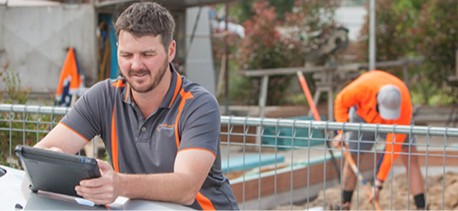Plumber flushes away paper blockage with mobility tools

The mobile initiative, built on connected tablets and business apps, has resulted in exceptional benefits for the business. These include increased billable hours, flexibility for employees, access to job information on the go, and secure documentation of job and financial data.
Undertaking commercial, domestic and maintenance plumbing in a 200-kilometre radius around the rural Queensland town of Kingaroy, the business has nine plumbers in the field. When Todd Fiedler bought the plumbing business from its previous owner three years ago, he inherited a work dispatch and accounting system based on printed job cards. Fiedler's growth plan for the business was hampered by the old system. Processes could not support the extra volumes and the business soon began to drown in paper.

"It was a nightmare for that first 12 months," Fiedler recalls. "I was just losing the plot with the paper. I couldn't keep track of jobs and I couldn't find jobs. People would be ringing me up saying, 'Todd, you haven't sent us a bill'. I'd be asking 'For what job?'"
He estimated each of his plumbers was losing an hour a day sorting paper records — time he reckoned should have been spent doing billable work.
"That's eight man-hours lost every day on paperwork. It's like having one man down, every day," he laments.
Tech Pro Research
Fiedler knew he needed to streamline his business operations and set about deploying a fleet of five tablets equipped with the GeoOp location-based job management app which also integrates neatly with the company's Xero accounting system.
He now manages his workload — sometimes up to 40 jobs a day — on tablets. The five tablets are shared amongst the workforce, using a shared carrier data plan of 20GB. Workers can keep an eye on their work day and manage their workload accordingly — saving them up to an hour a day, and they no longer need to keep going back to the office to fill out paperwork. When they arrive on site, the staff take photos, upload it to the job card on their tablet, providing the business with secure documentation of each job.
"There are a lot more billable hours now. All the parts are there, everything's there, it's just tick and flick, and away the boys go. GeoOp and Xero linking to each other streamlined our invoicing process," said Fiedler .
As a result of streamlining its invoicing system, the company dramatically improved its financial performance as invoice turnaround was reduced from two weeks down to two hours.
The new system saves Fiedler hours on the phone organising his team of plumbers and automates the masses of laborious invoicing and data-entry.
"Before, I was up Sunday nights doing it," he says. "You'd get tired, go to bed, then wake up and start again on Monday morning. Now I leave it all to Monday, because it's such an easy process."
Another major benefit of moving to a paperless office, is that Fiedler recovered time in his day to spend on more important things than paperwork. He now has more time to spend with his family of four children, as well as additional time to spend on developing and growing his business.
Fiedler says that the dramatic increase in billable hours and the fact that staff are no longer tied to the office, has meant his plumbers' job satisfaction has also increased.
"The staff are really enjoying the flexibility that the technology provides, allowing them to work in the comfort of their own home, providing them with access to the system whenever they need," he says.
Featured
Fiedler Brothers Plumbing has also started using social media to drum up additional business. And for occasionally retrieving tools left behind on the job. Fiedler's wife, Renee, manages the company's Facebook page and once posted a notice about a lost tool. Within six hours, it had been shared by approximately 1,000 people — and the errant tool was eventually repatriated.
Fiedler admits that as a tradesman who started his career prior to the digital era, he was somewhat daunted by the prospect of abolishing the paper-based job dispatch system and taking the technological plunge. He says that when it came to technology and automated systems, there was real fear of the unknown. However, with a younger workforce, his staff adapted very quickly, which helped him break down this barrier.
"It might seem daunting to start with, but if you're even thinking about it, go for it. There is no doubt that technology is moving at a rapid pace, and if you fight it, competitors will well and truly beat you to it."